|
|
|
Sort Order |
|
|
|
Items / Page
|
|
|
|
|
|
|
| Srl | Item |
| 1 |
ID:
090897
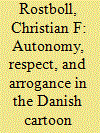

|
|
|
|
|
| Publication |
2009.
|
| Summary/Abstract |
Autonomy is increasingly rejected as a fundamental principle by liberal political theorists because it is regarded as incompatible with respect for diversity. This article seeks, via an analysis of the Danish cartoon controversy, to show that the relationship between autonomy and diversity is more complex than often posited. Particularly, it asks whether the autonomy defense of freedom of expression encourages disrespect for religious feelings. Autonomy leads to disrespect for diversity only when it is understood as a character ideal that must be promoted as an end in itself. If it by contrast is understood as something we should presume everyone possesses, it provides a strong basis for equal respect among people from diverse cultures. A Kantian conception of autonomy can justify the right to freedom of expression while it at the same time requires that we in the exercise of freedom of expression show respect for others as equals.
|
|
|
|
|
|
|
|
|
|
|
|
|
|
|
|
| 2 |
ID:
085950
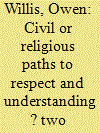

|
|
|
|
|
| Publication |
2009.
|
| Summary/Abstract |
While trends towards secularization may have appeared inexorable as the last century came to a close, more recent events, particularly in the aftermath of 9/11, have led to greater attention being paid to the resurgence of religion globally. But how to represent and portray religion, with respect and understanding, in this new environment may contain significant challenge-a subject which this paper considers in the light of two recent Commonwealth Reports. The Report of the Commonwealth Commission on Respect and Understanding, entitled Civil Paths to Peace, chaired by Amartya Sen, and presented recently to the Commonwealth Heads of Government summit in Kampala, Uganda, seeks to downplay any single-minded concentration on religion in favour of promoting broader civil engagements in crafting civil paths to peace. In contrast, the Commonwealth Foundation's Report, Engaging with Faith, treats religion more sympathetically and encourages understanding and cooperation between the faith communities. The former Report may tend to treat religion as part of the problem, while the latter might view religion as part of the solution. Thus, the two Reports illustrate contrasting and conflicting views as to the place of religion in efforts to promote global peace and development along the path to respect and understanding.
|
|
|
|
|
|
|
|
|
|
|
|
|
|
|
|
| 3 |
ID:
091724
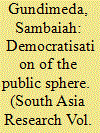

|
|
|
|
|
| Publication |
2009.
|
| Summary/Abstract |
Equality of treatment for all citizens and their cultures in public places is one of the prominent declarations of the secular Constitution of India. The hegemony of Hindu culture in the public sphere, however, reflects a dichotomy between stated declarations and social reality. Placing Dalits at the bottom of the caste hierarchy, if not outside it, 'mainstream' Hindu culture not only marginalised but importantly rejected the Dalits and their culture. This article examines the saga of the demand for a beef stall by the Dalit students in Hyderabad Central University and argues that the rejection of the culture of any community injures the human agency of that community. It is proposed that such injury can be healed only by a dialogical process, involving assertion of positivity and pride in the culture of the injured and positive recognition of such assertion by the injurer. Democratisation of the public sphere can be actualised by according representation to marginalised cultures, but in addition such representation needs to be accompanied with respect.
|
|
|
|
|
|
|
|
|
|
|
|
|
|
|
|
| 4 |
ID:
175400


|
|
|
|
|
| Summary/Abstract |
This article uses snapshots, rather than the ongoing flows of diffusion/contestation typically emphasized by constructivists, to explore the exercise of power through normative change. Its case is a high-profile Human Rights Council initiative: the UN Guiding Principles on Business and Human Rights (UNGP s). These UNGP s have successfully presented meanings as fixed while actually stretching those meanings’ boundaries. They reconceptualize what it means to “respect” and “protect” human rights. This is surprising given that the principles were framed as a conservative exercise at clarification, and under-noticed due to the legal rather than conceptual focus of the existing critical literature. To respect human rights, according to the UNGP s, agents need to take costly positive action. Furthermore, protect obligations come before respect. These are significant innovations. On the other hand, two missed opportunities of the UNGP s are their thin harm-based foundation for respect obligations, and their state centrism about who has duties to protect.
|
|
|
|
|
|
|
|
|
|
|
|
|
|
|
|
| 5 |
ID:
095283
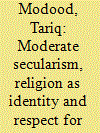

|
|
|
|
|
| Publication |
2010.
|
| Summary/Abstract |
Political secularism takes many forms but a fundamental distinction is between radical and moderate kinds. The latter is a genuine secularism and not just a failure to take secularism to its logical conclusion. The failure to appreciate this obscures the secularism that exists in western Europe. Namely, an accommodation of organised religion which sees it as a potential public good or national resource (not just a private benefit), which the state can in some circumstances assist to realise-even through an 'established' church. I adumbrate five types of reasons the state might be interested in religion: truth, danger, utility, identity and respect. The challenge facing such secularism today is whether it can be pluralised or multiculturalised, in particular whether it can accommodate Muslims. A ground for optimism is the respect that some people, especially some Muslims, have for religions other than their own.
|
|
|
|
|
|
|
|
|
|
|
|
|
|
|
|
| 6 |
ID:
137940
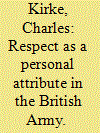

|
|
|
|
|
| Summary/Abstract |
This article describes the results of research into the social phenomenon of “respect” as framed by junior members of the British Army, as part of a wider study into the Values and Standards of the British Army. This research was interview based, using qualitative analysis software to detect, manage, and draw conclusions from the qualitative data recorded in those interviews. The data indicated that the primary situation in which “respect” was visualised by the participants was the unit context, and that it comprised a combination of three different strands: respect for rank or “hierarchical respect,” “professional respect” for a person’s military competence, and “personal respect” for an individual’s character, personal behaviour, and attributes. The overall respect that an individual is given arises from the combination of these three areas. “Respect” as a concept was, in the soldiers’ characterisation, something that had to be earned (except for the “given” represented by rank) and was not stable: a person’s fund of respect could go up or down in social value. Respect was also linked to trust: the more respect a person had, the more they could be trusted. Although the unit context was the primary one for discussing their framing of the concept of respect, many of the participants reported a wider dimension in which every human being deserves a basic level of respect simply for being human, and this level could not be forfeited.
|
|
|
|
|
|
|
|
|
|
|
|
|
|
|
|
|
|
|
|
|